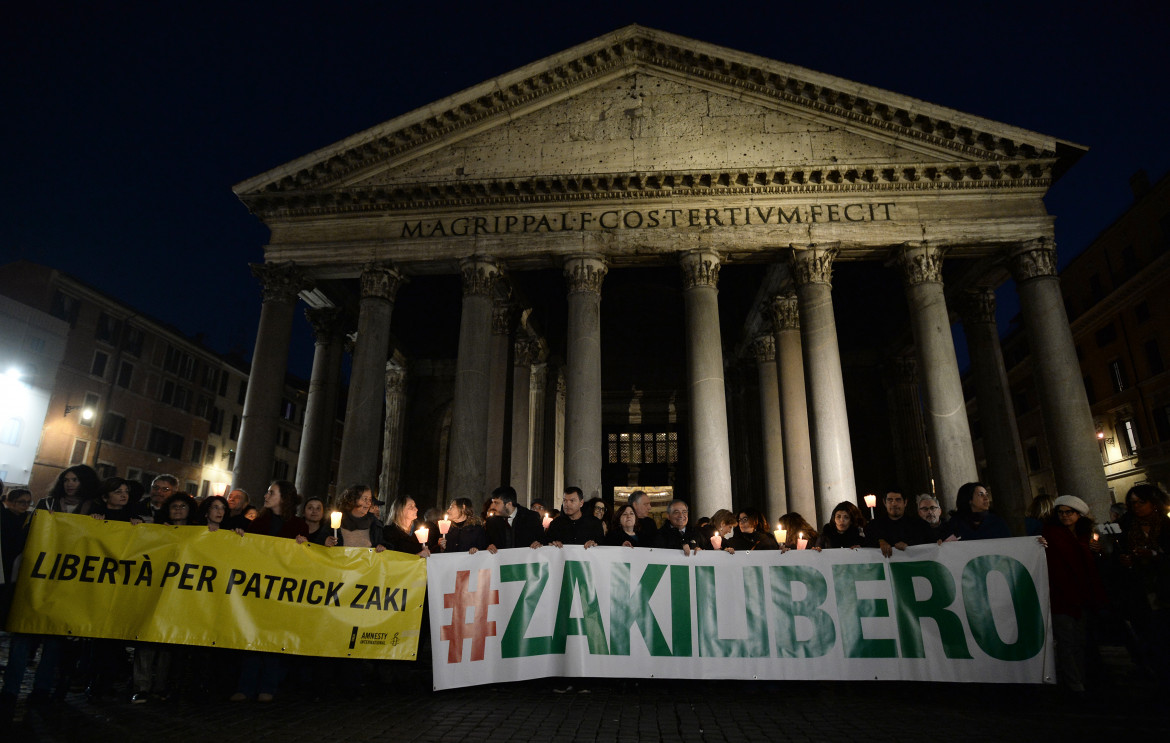Analysis
Italian Senate favors citizenship for Patrick Zaki as new witnesses emerge in Regeni case
The Senate motion was a symbolic act, but an important one, which came on the same day when the prosecutor of Rome filed the transcripts of three other witness testimonies that accuse the four members of the Egyptian secret service of having kidnapped, tortured and killed Giulio Regeni.

Senator-for-life Liliana Segre, 90, a Holocaust survivor, braved the journey from Milan to Rome, despite her “strength that isn’t always at its best,” to be present on the Senate floor and vote for the motion—approved with 208 votes for, zero against and 33 abstentions (among others, the senators of FdI)—which asks the government to grant Italian citizenship to the 29-year-old Egyptian researcher from the University of Bologna, in preventive detention since February 7, 2020, at the maximum security Tora prison on the outskirts of Cairo.
“There’s something about Patrick Zaki’s story that hits you in a special way, and it’s that it reminds you that an innocent person is in prison,” she said. “I’ve experienced that myself, and I’ll always be there, at least in spirit, when freedom is at stake.”
The Senate motion was a symbolic act, but an important one, which came on the same day when the prosecutor of Rome filed the transcripts of three other witness testimonies that accuse the four members of the Egyptian secret service of having kidnapped, tortured and killed Giulio Regeni.
And it came on the same day SI Deputy Nicola Fratoianni presented a parliamentary question for Ministers Lamorgese, Cartabia and Guerini, asking them to shed light on the case of an Egyptian soldier accused of attempted sexual assault in La Spezia, who managed to escape and go back to Egypt just before he could be arrested by the Italian police. The man was in the Ligurian city together with other Egyptian comrades, waiting for the delivery of one of the Fremm frigates sold by Italy to Egypt.
At this point, there are eight reliable witnesses (others have come before the investigators, but their testimony was not deemed usable) that Prosecutor Michele Prestipino and substitute Sergio Colaiocco will cite before the judge in the preliminary hearing set for April 29, requesting the trial of General Tariq Sabir, Athar Kamel Mohamed Ibrahim, Uhsam Helmi and Magdi Ibrahim Abdelal Sharif, the latter accused by the first witnesses of being the torturer of the Friulian researcher.
From what we could learn from the press agencies, the new witnesses have brought “new elements of knowledge on the facts already ascertained.” In particular, the testimony confirmed that the cover-up by the Cairo secret services began immediately, already on February 2, 2016, on the day before the discovery of Giulio’s body next to the road between Alexandria and Cairo.
On that day, one of the witnesses, who says he was a friend of Mohammed Abdallah, the head of the independent vendors’ union who turned Regeni in, told prosecutors that he saw Abdallah frightened, and that the latter confided in him that he had learned of Giulio Regeni’s death from a police officer at the Dokki police station, where they were already working on “the solution to divert attention away from them”: namely, “staging a robbery gone wrong.” Regeni was tortured for days in room number 13 of a small villa that, according to witnesses, was used by the Egyptian secret services to torture—and sometimes kill—opponents of the regime accused of “treason.”
Patrick Zaki, the human rights activist detained for almost 15 months on charges of terrorism and defamation of the state through the mass media, might have ended up there as well. As his best friends have explained many times, the fact that this didn’t happen is thanks to the international pressure and attention drawn to his case. This is why the motion voted by the Senate, although “symbolic and without practical effects to protect the person concerned,” as explained on the Senate floor by the Deputy Minister of Foreign Affairs and Vice President of the Democratic Party, Marina Sereni, is still important, because the text is asking the government to urge the Egyptian authorities to release of the researcher, to monitor the process and to take active measures at European level and as part of the G7 for the protection of human rights around the world.
However, according to Sereni, “the granting of citizenship to Zaki could even be counterproductive,” and Italy in any case could not “provide consular protection to the young man, as he is also an Egyptian citizen, and his Egyptian citizenship would prevail.”
According to the “Station to Station” organization, the authors of the Change.org petition to grant Zaki Italian citizenship, which has collected 200,000 signatures since the beginning of the year, “the time of promises and good intentions is over. Now we need concrete steps for Zaki and for the respect for human rights.” In support of the request to grant citizenship to the researcher who had chosen Italy as his adoptive country, the Rome Municipal Council also passed a motion that gives Mayor Raggi the task to lobby the government towards this goal.
Unfortunately, Zaki is not the only innocent in Egyptian prisons: on Wednesday, 74 international NGOs asked the government of Al-Sisi “to immediately and unconditionally release” the student and researcher Ahmed Samir Santawy, 29 years old, based in Vienna and “arbitrarily detained” in Egypt “since February 1, 2021 on bogus terrorism-related charges.” Italy can no longer turn a blind eye.
Originally published at https://ilmanifesto.it/il-senato-vota-la-cittadinanza-a-patrick-zaki-per-regeni-nuovi-testimoni/ on 2021-04-15
